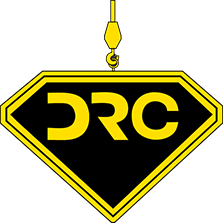As Texas’s premier rigging and crane training school, we are your trusted partner on the path to becoming a certified crane operator. In this guide, we’ll emphasize the vital importance of proper training in this field. Crane operators have significant responsibilities to ensure safety and project success. This makes proper training essential.
But how do you become a crane operator? Join us as we explore the key steps to certification, career opportunities, and success stories from our graduates. Let’s start your journey to becoming a certified crane operator in Texas with Diamond Rigging and Crane.
Understanding the Role of a Crane Operator
What does a crane operator do?
Crane operators are skilled professionals. They are responsible for the safe and precise operation of cranes in various work environments. These people are the ones who make it possible to move heavy equipment with precision and efficiency.
Operating a crane involves working with a control panel or console to lift, lower, and move loads, often in tight spaces or at considerable heights. Crane operators need to have a deep understanding of the machinery they work with. They also need to be able to interpret signals from spotters or other team members. Their role is pivotal in ensuring that construction and industrial projects run smoothly and safely.
Responsibilities and Daily Tasks of a Crane Operator
The responsibilities of a crane operator extend far beyond merely moving loads. Their daily tasks include:
1. Equipment Inspection
Before each shift, crane operators inspect their equipment, checking for any signs of wear, damage, or malfunction. Safety is paramount, and this inspection ensures that the crane is in optimal working condition.
2. Load Planning
Crane operators must assess the weight and dimensions of the load they are tasked with moving. They also must know the working conditions and obstacles in the vicinity. Proper load planning is crucial for safe and efficient operations.
3. Operating the Crane
Once on the job site, operators manipulate the crane’s controls to lift, lower, and transport materials. This demands precise coordination and communication, often through hand signals or radios with ground spotters.
4. Safety Protocols
Crane operators are responsible for adhering to strict safety protocols. This includes maintaining safe distances from power lines, securing loads properly, and ensuring the stability of the crane during operations.
5. Communication
Effective communication with the ground crew and other workers is vital to prevent accidents and ensure that operations run smoothly. Crane operators must follow instructions and relay important information when necessary.
Importance of Safety in Crane Operations
Safety is paramount in crane operations. The consequences of accidents involving cranes can be severe, resulting in injuries, fatalities, and costly damage to property. Crane operators play a pivotal role in maintaining safety by:
Following Industry Standards
Operators are trained to adhere to industry standards set by organizations like OSHA (Occupational Safety and Health Administration). These standards govern everything from equipment maintenance to load capacities and safety procedures.
Risk Assessment
They assess potential risks associated with the operation, such as unstable ground conditions, overhead obstacles, or adverse weather. This proactive approach minimizes the chances of accidents.
Awareness
Crane operators maintain an awareness of their surroundings, especially in congested work areas. They must always be prepared to react swiftly to changing conditions or emergencies.
Teamwork
Effective communication and teamwork with spotters, ground crews, and other personnel are essential to prevent accidents. Crane operators and their support teams must be in sync at all times.
Understanding the critical role of crane operators, their daily responsibilities, and their unwavering commitment to safety underscores why proper training and certification are essential for anyone aspiring to join this profession.
Prerequisites for Becoming a Crane Operator in Texas
Becoming a crane operator in Texas comes with some prerequisites for safety and competence. You’ll need at least a high school diploma or its equivalent, as basic math and reading skills are essential. You must also be at least 18 years old and in good physical shape to handle the demands of the job. Having a valid driver’s license is a must since you may need to drive cranes between job sites.
You must also have four years of Rigger experience, which requires Rigger certification and training. Luckily, we offer this training in our Rigger 1 and Rigger 2 classes, which is the foundation for most of our tracks.
Expect background checks to ensure your record is clean and doesn’t pose safety risks. Additionally, picking the right training school like Diamond Rigging and Crane is crucial. A reputable school provides excellent education, hands-on experience, and skilled instructors, setting you up for success as a crane operator in Texas.
The Training Process at Diamond Rigging and Crane
Becoming a skilled crane operator at our school involves a training process we design to ensure safety and skill. First, we provide a comprehensive overview of our training program. This covers all aspects of crane operation, safety procedures, and industry best practices. Our instructors play a pivotal role in your education. Our goal is to bring our wealth of knowledge and real-world experience to the classroom and training field.
Our training approach combines hands-on learning with classroom instruction. That way, you to gain practical skills while understanding the theoretical aspects of crane operation. Safety is our top priority. We place a strong emphasis on teaching and adhering to safety protocols and OSHA standards throughout our training program, preparing you for a successful and secure career as a crane operator.
Steps to Obtaining a Crane Operator Certification
Becoming a certified crane operator involves a systematic process that ensures you are fully equipped for the job. First, you’ll need to enroll in a certified training program, like the one offered at Diamond Rigging and Crane. These programs provide the essential education and hands-on experience required for certification.
Next, you’ll work towards completing the required training hours, where you’ll gain practical skills and confidence in crane operation. The certification process includes passing both written and practical exams. These will test your knowledge and ability to operate cranes safely and efficiently. Once you’ve completed your training and examinations, you’ll be ready to get the necessary licenses and certifications that allow you to legally operate cranes in Texas. These open the door to a fulfilling career as a certified crane operator.
Career Opportunities for Certified Crane Operators in Texas
Becoming a certified crane operator in Texas opens doors to a promising job market with various opportunities. Firstly, let’s explore the job market; Texas boasts a robust construction and industrial sector, which constantly requires skilled crane operators. Many industries, such as construction, manufacturing, and energy, actively hire crane operators to handle their lifting and materials-handling needs.
In terms of industries, crane operators are in demand across a spectrum of sectors. The construction industry, including residential, commercial, and infrastructure projects, is a primary employer. Additionally, manufacturing facilities frequently require crane operators to manage heavy materials. The energy sector, which encompasses oil and gas operations, power plants, and wind energy projects, also offers significant opportunities for crane operators.
One of the most enticing aspects of a career as a certified crane operator in Texas is the potential for growth and specialization. With experience, operators can advance to supervisory roles or specialize in operating specific types of cranes, such as tower cranes or mobile cranes. This career path offers not only increased responsibilities but also higher earning potential. Moreover, the ever-evolving construction and industrial landscape ensures a steady demand for skilled crane operators, promising job security and opportunities for career advancement in the Lone Star State.
Frequently Asked Questions
Now that you have an understanding of what it takes to become a crane operator, let’s answer some common questions we get about our field:
1. How long does it take to become a certified crane operator in Texas?
The time it takes to become a certified crane operator in Texas can vary depending on several factors, including the training program you choose and your dedication to completing the required training hours. Generally, it involves enrolling in a certified training program, completing the necessary training hours, passing written and practical exams, and obtaining the required licenses and certifications. This process typically takes several months, but the exact duration may vary.
2. What industries in Texas hire certified crane operators?
Texas offers a wide range of opportunities for certified crane operators. Industries that frequently hire crane operators include construction, manufacturing, and the energy sector, which includes oil and gas operations, power plants, and renewable energy projects. Whether it’s working on construction sites, handling materials in manufacturing facilities, or contributing to the energy sector’s infrastructure, certified crane operators are in demand across various industries in the state.
3. What sets Diamond Rigging and Crane’s training program apart from others?
Diamond Rigging and Crane’s training program stands out for several reasons. Our program provides a comprehensive education that covers all aspects of crane operation, safety procedures, and industry best practices. Our experienced instructors bring real-world expertise to the classroom and training field.
We combine hands-on learning with classroom instruction. We aim to ensure you gain practical skills while understanding the theoretical aspects of crane operation. Safety is our top priority, and we emphasize adherence to safety protocols and OSHA standards throughout our training program. That way, you are prepared for a successful and secure career as a crane operator.
Learn More With Diamond Rigging and Crane
In conclusion, embarking on the journey to become a certified crane operator in Texas is a promising and fulfilling career choice. Diamond Rigging and Crane stands as your dedicated partner, offering top-tier training and guidance every step of the way.
Safety, skill, and dedication are the cornerstones of success in this field. By choosing the right training institution and following the outlined steps, you’re ready for a career in this field.
Register with us as we help you reach new heights as a certified crane operator in the Lone Star State. Your journey begins here.





